Malala Yousafzai: Queen Elizabeth Hospital surgery to repair skull
- Published
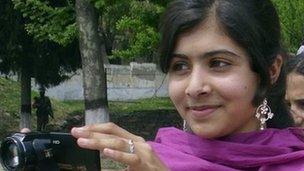
Malala Yousafzai was shot in the head in October
Doctors have revealed how they are going to repair a missing area of the skull of Pakistani schoolgirl activist Malala Yousafzai.
Surgeons at Birmingham's Queen Elizabeth Hospital have been giving details about two procedures due to be carried out on the 15-year-old.
Malala was discharged from the hospital earlier this month after being shot in the head by the Taliban in October.
The hospital said the surgery would take place in the next 10 days.
The first procedure will involve drilling into her skull and inserting a custom-made metal plate.
Doctors said Malala had been left completely deaf in her left ear when she was shot at point-blank range.
'Remarkable recovery'
The shockwave destroyed her eardrum and the bones for hearing.
The second procedure will involve fitting a small electronic device that provides a sense of sound to someone who is profoundly deaf or severely hard of hearing.
Prosthetist Stefan Edmondson at Birmingham's Queen Elizabeth Hospital explains how a titanium plate can be used to repair a damaged skull
Dr Dave Rosser, medical director at the QEHB, said: "Her recovery is remarkable and it's a testament to her strength and desire to get better.
"There is no doubt that the surgery she underwent in Pakistan was life saving.
"Had that surgery not been of such a high standard she would have died."
He added each procedure should take about 90 minutes and her full recovery could take another 15 to 18 months.
Dr Rosser said the missing part of Malala's skull had been put in her abdomen by surgeons in Pakistan, in order to "keep the bone alive".
Doctors in Birmingham have chosen to use a metal plate to repair her skull instead of that bone, which they say may have shrunk.
Dr Rosser added this was common practice worldwide to keep the bone healthy.
He said: "Malala currently has no skull, she only has skin covering the brain."
'Unique' hospital
Malala has asked to keep the bone once it has been removed, said Dr Rosser.
The QEHB is home to the Royal Centre for Defence Medicine where members of the armed service who have been injured overseas are treated.
Dr Rosser said the hospital was "unique" because all the treatment Malala required could be done within the same organisation.
Stefan Edmondson, principal maxillofacial prosthetist, at the QEHB said: "What we're doing here could be done elsewhere but because we're such a large super-regional unit with a large neurological unit we see a lot more advanced cranial defects.
"We're fortunate in that aspect to see a lot more complicated cases and [it means] we have the software here."
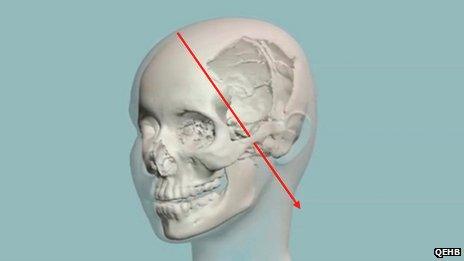
The red line in this 3D image of the cranial reconstruction surgery planned for Malala shows the approximate journey of the bullet that shattered her skull
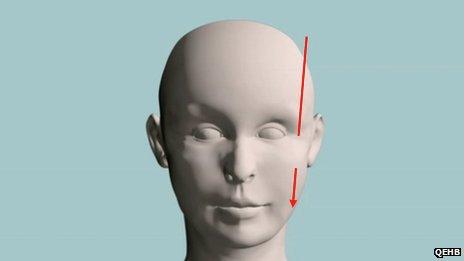
The bullet hit Malala's left brow and instead of penetrating her skull it travelled underneath the skin, the length of the side of her head and into her shoulder
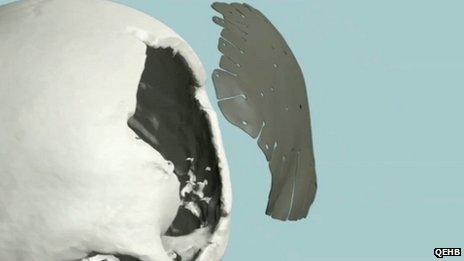
The procedure includes repairing the missing area of skull with a titanium plate that has been moulded to accurately replicate Malala's skull
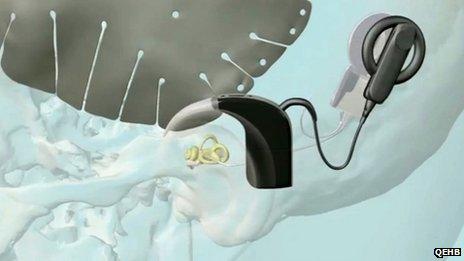
An electronic device that provides a sense of sound to people profoundly deaf or severely hard of hearing will be fitted as the second part of the procedure
Malala came to prominence when, as an 11-year-old, she wrote a diary for BBC Urdu, external, giving an account of how her school in Mingora town dealt with the Taliban's 2009 edict to close girls' schools.
Her love for education, and her courage in standing up to the Taliban, earned her a national peace award in 2011.
Tens of thousands of people have signed a petition calling for Malala to receive the Nobel Peace Prize.
The Pakistan government has given Malala's father, Ziaududdin Yousafzai, a job in Birmingham as the education attache at the Consulate of Pakistan for at least three years.
Dr Dave Rosser of the Queen Elizabeth Hospital said a missing part of Malala Yousafzai's skull would be replaced with a titanium plate
- Published4 January 2013
- Published3 January 2013
- Published2 January 2013
- Published18 December 2012
- Published26 October 2012
- Published12 October 2012
- Published10 October 2012
- Published10 October 2012